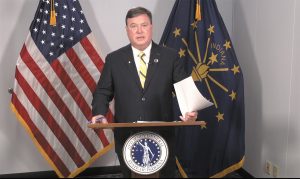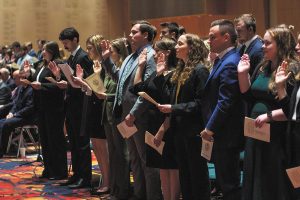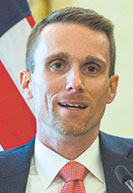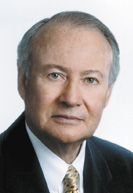Subscriber Benefit
As a subscriber you can listen to articles at work, in the car, or while you work out. Subscribe NowNews cycles are a funny thing.
Some years, when it’s time for the Indiana Lawyer staff to compile our annual Year in Review Top 10 stories of the year, the “top” story is crystal clear. In 2022, for example, the U.S. Supreme Court’s overturning of Roe v. Wade and the ensuing passage of a near-total abortion ban in Indiana — and the related fallout — was easy to identify as the year’s most pressing story.
But in other years, the standout story is less clear. 2023 is one such year.
Sure, we have a list of Top 10 stories that you’re about to read, but creating that list wasn’t as black and white for us. Take abortion, for example — it’s still a very relevant topic, but is it still No. 1? Or what about more generalized issues, like the statewide attorney shortage? That was obviously a top story this year, but how do you “define” what that story is?
All that to say: 2023 was a newsy one, to use an industry term. So when the IL staff sat down to pick our top stories of the year, the voting was close.
Nevertheless, we were able to narrow down the year to what we consider the top 10 stories of 2023. Those stories, as voted on by the IL team, follow.

1. Attorney General Todd Rokita is disciplined
Perhaps unsurprisingly, the professional discipline of the Indiana attorney general — the state’s chief lawyer — ultimately made the top of our 2023 list. But this is an issue that actually goes back a year — specifically to the SCOTUS abortion decision that topped the 2022 list.
After the Dobbs decision sent the question of the legality of abortion to the states, Indiana became the first state to pass a near-total abortion ban in August 2022. One month prior, a public feud began between AG Todd Rokita and Dr. Caitlin Bernard, an Indianapolis OB-GYN who had previously been the named plaintiff in litigation challenging other Indiana abortion laws.
A quick recap: In July 2022, Bernard, through the Indianapolis Star, publicly shared that she had performed an abortion on a 10-year-old rape victim from Ohio who could not get the procedure in her home state. Rokita subsequently went on the Fox News program “Jesse Watters Primetime” and called Bernard an “abortion activist acting as a doctor — with a history of failing to report.” He also later publicly announced that his office was investigating complaints against Bernard related to the Ohio girl’s case.
A public back-and-forth ensued that played out in legal and administrative processes. Bernard was ultimately reprimanded by the Indiana Medical Licensing Board and fined $3,000 for patient privacy violations. Meanwhile, the Indiana Supreme Court Disciplinary Commission filed a three-count disciplinary complaint against Rokita in September 2023.
Then in early November, the Indiana Supreme Court publicly reprimanded Rokita for violations of Professional Conduct Rules 3.6(a) and 4.4(a) pursuant to a conditional agreement between the AG and the commission. Those violations related to his comments on “Jesse Watters Primetime.”
But that wasn’t the end of the story. Following his reprimand, Rokita released a statement saying he could have defended his actions, but “(i)n order to resolve this, I was required to sign an affidavit without any modifications.”
That response has been described as defiant and seemingly against the conditional agreement. Indeed, according to the Indiana Capital Chronicle, the commission has now filed to unseal the conditional agreement because his public statements are inconsistent with its terms and have caused confusion.
The Indiana Supreme Court had not ruled on the commission’s request at IL deadline.

2. Abortion still in court
The Rokita-Bernard case wasn’t the only abortion-related issue in an Indiana court in 2023 — not by a long shot.

Arguably the most significant abortion decision of the year came on June 30, when the Indiana Supreme Court upheld the constitutionality of Senate Enrolled Act 1, the state’s near-total abortion ban that was passed in August 2022. The law bans abortion in the state except in narrow cases of rape or incest, fatal fetal anomaly, or to protect the life or health of the mother.
The issue had gone before the state’s justices in January after a trial court in September 2022 enjoined SEA 1 on state constitutional grounds. The judge in the Monroe Circuit Court ruled that the law violates women’s rights to privacy under Article 1, Section 1 of the Indiana Constitution.
But the high court lifted that injunction in a 4-1 ruling. Justice Derek Molter, the must junior justice, provided the rationale: “(A)fter examining Article 1, Section 1’s text, history, structure, and purpose, as well as our prior case law interpreting the provision, we hold that it is judicially enforceable. Finally, we hold that Article 1, Section 1 protects a woman’s right to an abortion that is necessary to protect her life or to protect her from a serious health risk, but the General Assembly otherwise retains broad legislative discretion for determining whether and the extent to which to prohibit abortions.”
Justice Christopher Goff penned a separate partial dissent, writing, “Enforcement of Senate Bill 1 would irreparably harm pregnant women who seek to exercise the choice not to carry a pregnancy to term. As to the balance of the equities and the public interest, I cannot find an abuse of discretion in the trial court maintaining the fifty-year status quo that was mandated by the United States Supreme Court in an effort to balance a woman’s liberty against society’s interest in fetal life.”
The justices subsequently denied rehearing, allowing SEA 1 to take effect for the second time, nearly one year after it was initially enjoined.
But even that didn’t end the abortion-related litigation in Indiana’s appellate courts.
Just this month, the Court of Appeals of Indiana heard oral arguments in a challenge to SEA 1 under the state’s Religious Freedom Restoration Act. In December 2022, a judge in the Marion Superior Court enjoined the law as a RFRA violation.
In arguments before the lower appellate court on Dec. 6, the new Indiana solicitor general, James Barta, argued that the state has a compelling interest in protecting fetal life as early as fertilization. But Ken Falk of the American Civil Liberties Union argued that SEA 1 imposes a substantial burden on the religious rights of the plaintiffs challenging the law.
The COA had not issued an opinion in the RFRA case at IL deadline.

3. The lawyer shortage
Now for the lawyer shortage we mentioned earlier.
According to the Indiana Public Defender Commission, the number of attorneys per capita in the workforce across Indiana counties was just 34% of the national average in 2023, down from 36% in 2020 and 46% in 2018.
The issue has been felt most acutely among public attorneys, particularly those employed as deputy prosecutors or public defenders. Pay disparity compared to private attorneys is often cited as a driving factor for the shortage of public attorneys.
On the prosecution side, officials have reported that in 2020, the average salary for an Indiana prosecutor was $69,777, while the average starting salary for a law school grad that years was $75,000.
And on the defense side, the median contract amount for defenders in counties participating in the Public Defender Commission’s program was $77,304 in the first quarter of 2023, compared to a median pay of $99,000 for entry-level attorneys at the Department of Child Services.
The attorney shortage is a statewide issue, but it can be more acutely felt in some rural communities. The theory is that attorneys in those communities are approaching retirement age with no obvious successors as new law school grads opt for private practice jobs to begin paying down substantial student loan debt.
The 2020 closure of Valparaiso University School of Law is also cited as a contributing factor to the lawyer shortage in Indiana, particularly in the northwestern portion of the state known as The Region. The school had been a reliable well of new talent for local prosecutor’s offices and public defender agencies that dried up with its closure.
But how does Indiana remedy those issues? Pay increases are often touted as an obvious first step, but advocates get mixed results from state and local governments when they ask for additional funding.
In 2023, there has also been an effort to open up new sources of attorneys in the state. More on that in Story 5.
4. Legal troubles for the Department of Child Services
It’s not uncommon for us to write about cases involving the Indiana Department of Child Services given the frequency of DCS-related cases that come out of the Court of Appeals.

(IL file photo)
But this year was a little different, because DCS found itself on the defense side of the courtroom more than once. Let’s focus on two of those cases.
First, in state court, there’s Estate of Judah Morgan by Jenna Hullett, Personal Representative v. Alan Morgan, 32D01-2301-CT-000004. There, the estate of 4-year-old Judah Morgan sued his father — and later his mother and DCS — after the child’s torture death upon his return to his parents following removal.
In October, a judge in Hendricks Superior Court found the agency in civil contempt for failing to search the emails of its current and former directors as part of discovery in the case.
In May, DCS — which was then a nonparty to the case — was ordered to produce documents responsive to the plaintiff’s request for production, but there were multiple delays and extensions.
At a contempt hearing on Sept. 25, DCS Director Eric Miller repeated that discovery production was complete as of Sept. 22. He also said neither his email nor the email belonging to former DCS director Terry Stigdon were part of the batch of documents produced.
The plaintiff later discovered some emails produced did include Miller and Stigdon from December 2020, about nine months before the death of Judah Morgan. Miller was chief of staff at the time.
DCS argued that the plaintiff essentially conceded that the agency produced responsive documents and that even though Miller’s email wasn’t part of the search, the results still “encompassed” those messages. But the judge disagreed, ordering DCS to produce all responsive emails to or from Miller and Stigdon by Oct. 19.
Meanwhile in federal court, the agency was sued in August for allegedly failing to adequately protect children in the state’s foster care system.
The three-count complaint alleged children were “languishing in state custody longer than ever before.” It also alleged systemic problems including staff turnover due to high caseloads and a failure to maintain an adequate medical record-keeping system for the children in its custody.
DCS has moved to dismiss the case and its class allegations. The online docket had not been updated since Nov. 13, as of IL deadline.
In response to criticism of the agency, a DCS spokesperson told IL in September, in part, “Our first priority is child safety.”
More from Year in Review: Honorable mentions
5. Changes to the legal education landscape
Indiana made a major change to its bar admission process in 2021 when it began administering the Uniform Bar Exam. Now, a second significant change could be coming.
This story largely centers on Purdue Global Law School, formerly known as Concord Law. The law school is an online-only program that does not have American Bar Association accreditation, which means its graduates can’t take the bar in the Hoosier State. But Purdue Global Law wants to change that, which is why Purdue University submitted a requested rule change that would have allowed graduates of certain non-ABA-accredited schools to take the Indiana bar.
Under the proposal, the law school would have been required to have accreditation from one or more state, regional or national bodies that specifically accredit law schools, and would have been required to be be operated by or affiliated with an Indiana-based educational institution whose legal education program/degree has been approved by the Indiana Commission for Higher Education.
Purdue touted its program as potentially helping to ease the state’s lawyer shortage, but groups including the Indiana State Bar Association and the Indianapolis Bar Association opposed the measure.
The Indiana Supreme Court accepted feedback on the proposal, then released its own proposal last month that would allow graduates of non-ABA-accredited schools to take the Indiana bar in two situations:
• If the applicant graduated from a non-ABA-accredited law school in the United States, was eligible to sit for the bar in another state, and the Board of Law Examiners finds the applicant is qualified to take the Indiana bar by education or experience.
• If the applicant completed legal education outside the U.S., obtained a graduate degree in American law from an ABA-approved school, and the BLE finds the applicant is qualified to take the Indiana bar by education or experience.
The ISBA came out in favor of the high court’s plan, telling the court that the proposed changes to Admission and Discipline Rule 13 “have the potential to increase the availability of proficient lawyers in Indiana while still ensuring a qualified entity vets the candidates petitioning to sit for the exam.”
But IndyBar still expressed reservation, urging the court to “proceed slowly and cautiously as it considers what we believe to be substantial departures from well-established practices and procedures for the admission of lawyers to the Bar of the State of Indiana.”
The justices accepted comment on the proposal through Dec. 15. A final order on the proposal had not been released at IL deadline.

6. Student loan forgiveness, affirmative action struck down at SCOTUS
Two major decisions from the U.S. Supreme Court this summer had a direct and immediate impact on Indiana’s law schools and students. We’re talking, of course, about the decisions striking down the Biden administration’s plan for widespread student loan forgiveness, and the decision ending affirmative action in college admissions.
On the issue of student loan forgiveness, the justices ruled 6-3 in Biden v. Nebraska, 600 U.S. ___ (2023), that the president’s plan to forgive up to $20,000 per student in student loan debt — a plan that came with a $400 billion price tag — was not permissible under the Higher Education Relief Opportunities for Students, or HEROES, Act of 2003.
Chief Justice John Roberts wrote for the majority, consisting exclusively of the court’s conservative-appointed justices, “… (A)s we have already shown, the HEROES Act provides no authorization for the Secretary’s plan even when examined using the ordinary tools of statutory interpretation — let alone ‘clear congressional authorization’ for such a program.”
In Indiana, 2022 graduates of Notre Dame Law School had an average indebtedness of $123,364; graduates of the Indiana University Maurer School of Law have an average indebtedness of $85,164; and 2022 graduates of IU McKinney had an average indebtedness of $95,007.
As for affirmative action, the justices overturned admissions plans at Harvard College and the University of North Carolina. Roberts, again writing for the conservative majority, said universities have for too long “concluded, wrongly, that the touchstone of an individual’s identity is not challenges bested, skills built, or lessons learned but the color of their skin. Our constitutional history does not tolerate that choice.”
That decision is notable in Indiana, where all three law schools are led by diverse “firsts”: Karen Bravo, the first person of color to lead IU McKinney, G. Marcus Cole, the first Black person to lead Notre Dame Law, and Christiana Ochoa, the first Latina to lead IU Maurer.
At IU McKinney, Bravo said the school responded to the Supreme Court’s decision by changing its application to no longer ask about race or ethnicity, or for a diversity statement.
At Notre Dame, a prompt on its application now discusses the school’s mission to educate a “Different Kind of Lawyer,” then asks applicants what experiences, hardships or adversity they have faced that have shaped their perspectives on law and justice, and, “How has your own circle, culture, and community inspired you, your morals and ethics?”
At IU Maurer, Ochoa told Indiana Lawyer that the law school is abiding by the Supreme Court decision and has looked at all avenues that are legal in terms of admissions.
More from Year in Review: What you read
7. Indiana federal court seats get filled, but openings remain
There’s been some turnover on Indiana’s federal bench in recent years, and 2023 was no exception.
The year began with the confirmation of Judge Matthew Brookman to the U.S. District Court for the Southern District of Indiana. Formerly a magistrate judge at the Indiana Southern District, Brookman received bipartisan support to succeed now-Senior Judge Richard Young as the court’s Evansville jurist.

Brookman was nominated in December 2022, confirmed in March and sworn in in April.
Then in July, another nomination came down. This time it was for the 7th Circuit Court of Appeals, where Magistrate Judge Joshua Kolar, currently of the Indiana Northern District Court, was nominated to succeed Judge Michael Kanne, who died in the summer of 2022.
Like Brookman, Kolar received bipartisan support from the Senate Judiciary Committee, but his nomination has stalled since then, with the full Senate having yet to take a final vote on his confirmation at IL deadline.
Meanwhile, two vacancies on the Northern District Court have been sitting open since Judges Theresa Springmann and Jon DeGuilio took senior status in 2021 and 2023, respectively. Their would-be successors weren’t announced until November, when St. Joseph Superior Judge Cristal C. Brisco and Elkhart Superior Judge Gretchen S. Lund were nominated to the federal bench.
Brisco and Lund have each appeared before the Senate Judiciary Committee, but a committee vote had not been held at IL deadline.
And coming in 2024, another seat on the Southern District will open up when Judge Jane Magnus-Stinson takes senior status. Her potential successor had not been announced at IL deadline.
If you want to learn more about these vacancies, check out Daniel Carson’s story on this topic in this issue.
8. New appellate court judges
Indiana’s appellate courts also saw turnover in 2023.
First came Judge Dana Kenworthy, whom Gov. Eric Holcomb appointed to the Court of Appeals in December to succeed now-Justice Derek Molter. Kenworthy, formerly of the Grant Superior Court, was sworn in to the COA in January, giving the lower appellate court the first female-judge majority in its history.



Then came Judge Paul Felix, whom Holcomb appointed to the COA in June to succeed now-Senior Judge Margret Robb, the court’s first female chief. Felix, formerly of the Hamilton Circuit Court, officially joined the appellate court in July.
The Court of Appeals is now once again split 8-7 between male and female justices, respectively.
Meanwhile at the Indiana Tax Court, longtime Judge Martha Blood Wentworth announced in April that she would be retiring after 12 years on the bench. Her retirement was notable because she was only the second Tax Court judge in the state’s history, following inaugural Judge Thomas G. Fisher.
Wentworth’s successor is Justin McAdam, who was appointed by Holcomb in July. The Tax Court is McAdam’s first judicial gig. Prior to taking the bench, he had served as deputy director and chief legal counsel in the Indiana Office of Management and Budget, as well as stints in private practice and as a judicial clerk.
The various appellate court appointments meant 2023 was a busy year for Indiana’s Judicial Nominating Commission. The seven-member commission, led by Indiana Chief Justice Loretta Rush, was tasked with interviewing applicants for each vacancy on the Court of Appeals as well as the Tax Court vacancy, then ultimately selecting three finalists for Holcomb to choose from.
More from Year in Review: Features, obits and discipline
10. Cameras in court (tie)
Like a few of our other top stories of 2023, this one actually began in 2022.
In July of that year, the Indiana Supreme Court announced a proposed amendment to Judicial Conduct Rule 2.17 giving Indiana trial court judges the discretion to allow news media to broadcast, televise, record and photograph court proceedings.
That proposal followed a four-month pilot program in courts in Allen, Delaware, Lake, Tippecanoe and Vanderburgh counties that allow for the broadcasting of certain in-person proceedings.
The results of that pilot program were generally positive, although participation was admittedly limited — in total, 41 media requests were approved during the program and two were denied due to confidentiality and safety concerns, and no requests were made in Lake or Vanderburgh counties.
Then came February 2023, when the Supreme Court officially changed Rule 2.17 to give judges the discretion to allow news media to broadcast court proceedings, effective in May. The amended version of Rule 2.17 now allows judges to authorize “the broadcasting, televising, recording, digital streaming, or photographing of court proceedings or the courtroom by members of the news media” under certain conditions.

The previous version of the rule had prohibited all broadcasting, recording or photographing of court proceedings or the area near courtrooms without prior approval from the Indiana Supreme Court.
“This is the culmination of years of work and pilot projects with discussion and evaluation,” Indiana Chief Justice Loretta Rush said in a news release announcing the rule amendment. “Trial court judges are in the best position to determine how to balance the importance of transparency while protecting the rights of people involved in a court matter.”
Speaking to reporters in November following the release of the Supreme Court’s annual report, Rush said of the amendment to Rule 2.17, “I think we all in all three branches of government need to do more with regard to transparency to just get our story out.”
While the amended rule will allow cameras in courtrooms, judges have ultimate discretion over whether to permit broadcasting. And the amendment does provide for certain prohibitions, including limiting broadcasting to nonconfidential proceedings, prohibiting showing minors and jurors on camera, and defining “news media” pursuant to Indiana Code § 34-46-4-1.
Also, judges can revoke a broadcasting authorization at any time and for any reason.

In addition to the pilot project, the Indiana Judicial Conference Community Relations Committee and Court Security Committee, Hoosier State Press Association and Indiana Broadcasters Association were part of the effort to authorize cameras in courts.
“Indiana, in a sense, came out of the Dark Ages thanks to the Indiana Supreme Court,” Dan Byron, general counsel for the Indiana Broadcasters Association and partner at Dentons Bingham Greenebaum, told IL in March.
10. Artifical intelligence (tie)
Our final top story of 2023 is one that has dominated conversations across industries: artificial intelligence.
It’s hard to narrow down what the “story” of artificial intelligence is, given that AI is a rapidly evolving technology. Recruiters are using it to draft job descriptions, students are using it (sometimes impermissibly) to assist with assignments and lawyers are using it to aid in legal research.
But that hasn’t always been a successful endeavor.
Perhaps the most notable example of AI use in the law gone bad came out of New York, where a federal judge this year fined two lawyers $5,000 for submitting briefs that included nonexistent caselaw “discovered” by AI.
According to The Associated Press, Senior Judge P. Kevin Castel of the Southern District of New York determined the two lawyers had acted in bad faith in submitting the briefs, although he did credit their apologies and remedial steps following the discovery of the error.
Castel said the bad faith resulted from the failures of the attorneys to respond properly to the judge and their legal adversaries when it was noticed that six legal cases listed to support their written arguments did not exist, AP reported in June.
But the use of AI in the law isn’t all bad, and many experts say the technology could soon become an inevitable part of the practice. To that end, legal organizations in Indiana are taking steps to make sure lawyers know AI best practices.
That includes the Indiana State Bar Association, which used its Annual Summit in September to launch a yearlong educational series called “AI in the Legal Industry: An ISBA Series Presented by LexisNexis.” The series will include continuing legal education events as well as practice-specific resources from various ISBA sections and committees.
Also, Taft Stettinius & Hollister LLP has partnered with Maryland-based SkillBurst Interactive to launch a training series on generative artificial intelligence for lawyers and other professionals, while Faegre Drinker Biddle & Reath has launched an algorithmic testing and AI governance and risk management service for insurers.•
Please enable JavaScript to view this content.
